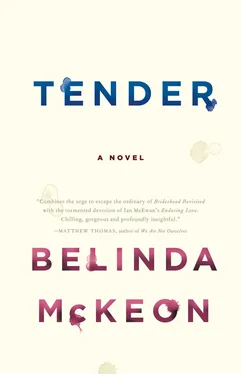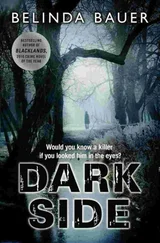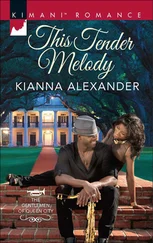“That’s a Noh Ritter,” Ashley said, following behind. “She just joined us in March, as you might have heard.”
“Mmm,” Catherine said.
“We’re all very excited about her new show. If you’re still in town, the opening is—”
“Oh, no, unfortunately I’m really just here to do the panel, and then I have to get back to London. The July issue is about to go to print.”
“Oh, that’s such a pity. Nate will be so sorry to have missed you, too. He was here earlier, but he’s in LA now until Tuesday.”
“What a pity.” Catherine nodded.
“And you actually know Nate a little, right? From Ireland?”
“Well, not really. I mean, we met, but that was a long time ago. A very long time ago, really. I’m surprised he remembers.”
“Oh, he remembers everything,” Ashley said with a theatrical little lift of her eyebrows.
“Yes, I’m sure,” said Catherine, trying, with her laugh, to achieve the same tone.
“Of course, you’re Irish,” Ashley said, tilting her head now. “But to be honest your accent sounds English to me.”
“Well. I’ve been living in London since I was twenty. That does things to your accent.”
“Oh — there! I can hear it!” Ashley trilled, pleased as a child who has just heard the first cuckoo. “Yeah! Does things, ” she said, in the ridiculous Hollywood brogue always used at such moments. But it could be worse. Ashley could be interrogating her further about her connection to Nate, and putting two and two together, with the glue of the Irish accent, and coming up with—
“Wait, so do you know James Flynn?” Ashley said then, more quietly, leaning in as though the matter was a confidential one, as though the knowledge of James and Nate’s now long-ended relationship was not as public, at least within the art scene, as these things could be. The rising young star just arrived in the city and the dapper young gallerist just opening his own space; the sell-out show and the affair that was an open secret; the older lover, wronged and betrayed and with his career on the skids and, a year and a half into the whole business, found dead in his loft on West 26th Street. Ed Dunne had in fact suffered a massive heart attack, as became clear with the coroner’s report a couple of weeks later, but this was 2005, when Gawker and the other media gossip sites were climbing towards their gleeful zenith, and the circumstances of Dunne’s death were the tinder for several posts about James and Nate and the tragedy to which their glamorous liaison had led. In London, Catherine, then still freelancing, had called into the Internet café on the corner almost hourly for updates; she had pored over the photographs of James and Nate at openings, of Nate and Dunne in their loft, of the glass-and-steel exterior of the new Lewis gallery, of James’s works on display there, that portrait series for which he had got so much attention — the high-school footballers, the bodega men, the hipster boys with their tattoos and their mullets, their four-hundred-dollar skinny jeans. James looked almost like one of those boys himself now, which Catherine found, out of all of it, almost the hardest thing to believe; there was a photograph of him standing outside the main entrance of Lewis at an opening, smoking, a bottle of Presidente in his hand, and his lip was curled like someone she had never known, and his clothes were shabby and expensive, and his eyes were sharp with cynicism and dark with something deeper.
He and Nate had lasted another couple of months after Dunne’s death, and then there had been the break-up, and the swoop of Jonathan Greene to snatch James away from the Lewis Gallery; by then, Catherine was an assistant editor at Frieze, and could track the story from the comfort of her cubicle and her high-speed broadband, and still call it work.
At Jonathan Greene in early 2007, there had been the collaboration with Ryan McGinley; in 2008 the HO-HO-HOPE! show, which had got the Artforum cover, and soon afterwards, the Infinity Award. On each of these occasions, Catherine was tempted to send a congratulatory note to James; she knew the magazine stationery would get any correspondence marked Personal past the gallery’s gatekeepers and on to his apartment in (she knew this from a Vogue profile) Bushwick. But she never knew what to say, or rather, how to go about saying it. She tried; she wrote the sentences; always, she ended up crossing the office to the industrial-sized shredder, and watching to make sure that they had turned into off-white ribbons. When, in June 2010, the civil union announcement appeared in “Vows,” with its language of almost comic combinations and formalities— James Flynn, 32, the son of Peggy Flynn and Michael T. Flynn of Leitrim, Ireland, will commit Sunday to Christian Brandt, 33, a son of Denise C. Brown and Dr. Arthur D. Brandt of Stamford, Connecticut —Catherine had actually gone to Paperchase and bought a card with two little, blue-tuxedoed grooms— I don’t think Armani does a navy-blue tuxedo, she had written inside it, across from her fondest wishes for many, many years of happiness and love, and that card was still in her desk on Montclare Street, just waiting for the office franking machine — just the office franking machine, that was all.
That was not all.
(Things, with her own groom, beginning to go so depressingly, irretrievably south during that same summer; that had not helped matters either, although it had also, arguably, been completely beside the point. Catherine M. Reilly, a daughter of Patricia M. Reilly and Charlie F. Reilly of Longford, Ireland, and Lucien F. Gordon, the son of Appalled Alexandra A. Gordon and Flare-Nostriled Thomas E. Gordon of Lancashire, et cetera, et cetera, were married Saturday and separated Monday, or near enough as makes no difference… )
“Oh no, not really,” Catherine said to Ashley now, with an apologetic wince. “I mean, I know of him, but Ireland’s funny like that. You’d be surprised the way that with some people, your paths never cross.”
“Oh, I can really hear your accent now,” said Ashley, staring at Catherine’s mouth in seeming wonder.
“Ha.”
“Well, anyway, if you’re interested, there’s a big Flynn in the Greene booth across the way,” Ashley said, pointing to the booth opposite, which was equally spacious, equally well-appointed, and equally equipped with a young blond assistant and a Russian bank vault’s worth of pieces. “I really like it, actually, though I’m not always sure about his work.”
“Oh, I know what you mean,” Catherine said, and with a smile and a thank you, she said goodbye.
* * *
The glass-walled auditorium in the center of the tent was full to capacity for the criticism panel. That was down to the participation of Hal Foster and Roberta Smith, though Dan Franks had his own groupies, too, Catherine suspected, and she noticed that when Foster or Smith spoke, there was respectful silence, contributions from Franks set a restless sort of charge ticking in the room, not the kind which made people want to get up and leave, but the kind which made them want to stand up and demand to hear more. Franks was in his late thirties, and was the founding editor of Mauve, a quarterly magazine dedicated to the crossover of contemporary art and fashion, the art content of which consisted partly of unsigned, notoriously snipey reviews, but mostly of photo essays of beautiful girls lying naked and spread-eagled across rusted fire escapes in Bushwick and long, possibly ketamine-fueled Q&As with high-end photographers or artists who had connections to the designers whose ads comprised most of the rest of the magazine. Though this was unfair, Catherine reflected now, half listening as Franks defended the particularly savage review of the Lucas Borga show which had run in Mauve ’s winter issue; the magazine had alerted her to the existence of countless younger artists she would never have found out about from the pages of Artforum or indeed Frieze, much less The New Yorker or the New York Times .
Читать дальше












